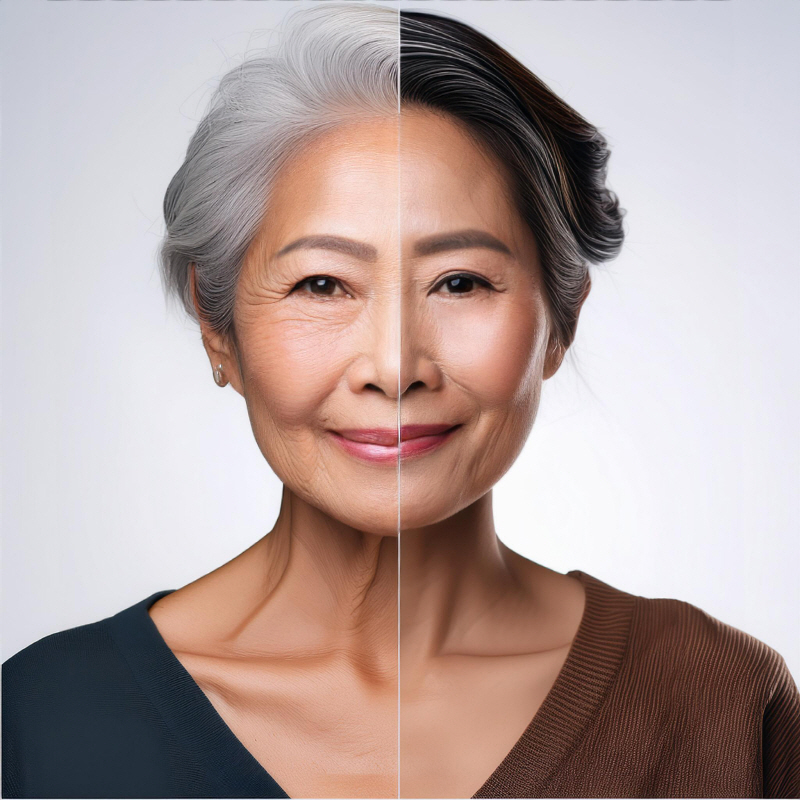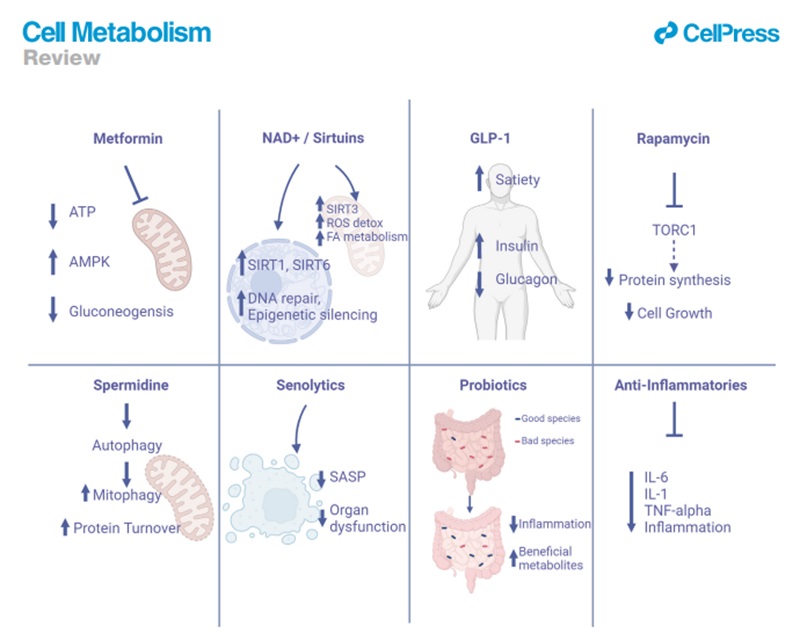In nature, phenomena that defy conventional concepts of aging often occur. Can these be applied to humans? Since the 2000s, rapid advancements in molecular biology have spurred extensive research into the causes of aging and ways to prevent it. Clinical trials for anti-aging drugs have started one by one since the 2010s. Currently, many people worldwide are testing anti-aging drugs on their bodies.
With the ongoing research on anti-aging drugs, the world’s leading experts in aging research conducted a thorough investigation and announced the most promising drugs earlier this year. Surprisingly, the most notable drugs were the most commonly available and very inexpensive.

The research team selected numerous drugs undergoing trials worldwide based on four stringent criteria. The first criterion is that the drug has been sufficiently tested in human clinical trials over the past decade. The second is that it has shown solid results in delaying aging in animal experiments. The third is that it is safe for long-term use in humans. The fourth is that it has a mechanism that weakens the main features of aging. Here are the promising anti-aging drug candidates identified by the world’s top aging researchers.
These days, such questions occasionally appear on medical information websites: “Can I get a prescription for metformin, a diabetes medication, for anti-aging purposes even if I don’t have diabetes?”

Recently, the Harvard Medical School published an article questioning, “Is metformin a wonder drug?” Metformin, originally a drug prescribed for diabetes, is now one of the most famous anti-aging drugs.
This shift in perspective came after a shocking study by Cardiff University in the UK in 2014, which compared three groups: type 2 diabetes patients treated with metformin, non-diabetics, and diabetes patients treated with another diabetes drug, sulfonylurea. The study followed these groups from 2000 and found that the survival rate was highest among diabetes patients treated with Metformin, even higher than those without diabetes. This study spurred extensive research into anti-aging drugs over the past five years.
“Currently, 14 institutions in the United States are conducting clinical trials on 3,000 healthy individuals to examine the effects of metformin on aging,” said Kyeong-kyu Kim, a professor of personalized medicine at Sungkyunkwan University School of Medicine. “The results, expected in two to three years, aim to secure U.S. Food and Drug Administration (FDA) approval for metformin as a treatment for aging.”
Recently, the world’s leading aging researchers published a comprehensive review in the journal Cell Metabolism, identifying eight promising anti-aging drug candidates. Some of these drugs mimic pathways inherent to our bodies, allowing us to delay aging and extend healthy lifespans without drugs.
Currently, numerous clinical trials on anti-aging drugs are being conducted simultaneously worldwide. Clinical trials for anti-aging drugs, which began in the mid-2010s, have recently increased explosively.
Huge investments are pouring into companies developing anti-aging drugs. Companies like Altos Labs, Calico Labs, and the Hevolution Foundation have received billions in investments. These companies conduct research by bringing in world-renowned scholars in aging research, including Nobel laureates.
Earlier this year, a comprehensive review of anti-aging drugs was published. They selected drugs that have definitively slowed aging in animal studies and have progressed to human clinical trials. These eight drugs each slow down aging in slightly different ways.

Naturally, the risks of diseases such as cancer, dementia, and heart disease, which are caused by aging, also decrease. While cancer, dementia, and heart disease can be influenced by genetics and lifestyle, age is the most significant risk factor.
Thus, the core idea of aging researchers is that preventing aging will naturally prevent these diseases. Now, let’s look at the key anti-aging drugs carefully reviewed and selected by leading aging researchers.
An elixir for immortality discovered in wildflowers
One such drug is metformin, derived from the plant French lilac or goat’s rue. This herb has been used since the Middle Ages to alleviate diabetes symptoms and as a sweat-inducing remedy during the “Black Death.” In 1918, it was discovered that guanidine, a component of this herb, lowers blood sugar levels. However, due to its toxicity, guanidine was modified in the lab, leading to the creation of metformin.
In the 2000s, animal experiments showed that mice fed metformin lived longer, prompting serious anti-aging research. Of course, there are some studies that suggest metformin does not reduce mortality rates, so it is somewhat controversial.
However, metformin strengthens cardiovascular function and the immune system in diabetes patients, reduces inflammation, and inhibits cancer cell growth in animal studies. These combined effects suggest that metformin is a low-risk, anti-aging drug that extends healthy lifespans.
“Metformin works by affecting the mitochondrial respiratory chain, reducing ATP and increasing AMP, thereby activating AMP kinase, which has known anti-diabetes effects,” said Professor Kim. “This mechanism explains metformin’s ability to lower glucose levels and exert anti-aging effects.”
The New drug controlling DNA switch
Another promising anti-aging drug is NAD+, an enzyme that activates the protein sirtuin. Sirtuins, discovered in the 1990s, extend the lifespan of yeast, worms, flies, and mice. Although these organisms may seem insignificant, yeast shares 70% of its genes with humans, and the nematode worm shares 49%, making them suitable models for studying human longevity genes. Sirtuins switch on genes that repair damaged DNA under stress, extending lifespans.
NAD+ levels decline with age, but they can be restored to youthful levels by supplementing NR or NMN. Resveratrol, quercetin, and fisetin are substances known to activate sirtuins, but NAD+ is considered the most effective among them. Research indicates that when sirtuins are activated by NAD+, biological age decreases, liver and blood metrics improve, and overall physical function is enhanced.
“Sirtuins have a long research history,” Professor Kim said. “It was discovered that the lifespan of yeast extends when the protein SIR2 is created. This led to extensive research, revealing that humans have sirtuins 1, 2, 3, and 6. The mechanism involves calorie restriction, which allows NAD+ to slow down the mitochondrial chain, increasing NAD+ levels and activating sirtuins, thereby affecting AMP kinase. This is known to function similarly to rapamycin and metformin in extending lifespan.”
GLP-1 receptor agonists, like Wegovy, Ozempic, and Saxenda, also show promise as anti-aging drugs. These drugs, used for diabetes and weight loss, induce satiety and reduce appetite. In mouse studies, GLP-1 delayed and even reversed brain aging, improved cardiovascular health, and enhanced short-term memory.
One of the anti-aging drug candidates is rapamycin, which has been isolated from bacteria found in the soil of Easter Island, Chile. Rapamycin influences a protein called mTOR, temporarily halting cell growth and inducing our body to perform a deep cleanse of accumulated waste. This process is known as autophagy.

Rapamycin, extracted from bacteria, acts as a drug that cleanses our body. After a long period of clinical trials, it is now in the verification stage.
In animal experiments, rapamycin has repeatedly shown results of extending lifespan. When administered to very old mice, it increased the lifespan of males by 9% and females by 14%.
“When our body has abundant nutrients, mTOR is activated, sending signals to continuously grow cells,” Professor Kim explained. “Rapamycin inhibits mTOR. By blocking the proliferation and growth signals below it, we achieve the same effect as dietary restriction. Similarly, metformin activates AMP kinase, which is well known for inhibiting mTOR.
He added, “In summary, rapamycin or metformin achieves the changes in signal transmission caused by dietary restriction by inhibiting the functions of the proteins involved in the same intermediary processes.”
Other promising natural substances include spermidine, and senolytics, which removes senescent cells, , though more human clinical trials are needed. Probiotics, which improve gut microbiota, are also in the early clinical stages and require more time, with Lactobacillus and Bifidobacterium standing out among the microorganisms. Anti-inflammatory drugs like corticosteroids, aspirin, and ibuprofen were also considered candidates but require more clinical trials to confirm their safety.
“In 2013, the Spanish Cancer Center published a paper in ‘Cell’ on the ‘hallmarks of aging,’” Kim said. “They reported nine characteristic phenomena that define aging. However, it is still unclear if there is one underlying mechanism that penetrates all nine.”
He continued, “Despite this, epigenetics has recently gained the most attention. As we age, methyl groups attach to our DNA, leading to methylation. Research has shown that the extent of methylation correlates with aging. By looking at the degree of methylation, we can suggest the epigenetic age of a person’s cells. Methods to study the age of human cells have been developed, and it has been found that inducing aging epigenetically in mice causes them to age rapidly, while introducing epigenetic characteristics of young mice into old mice rejuvenates their cells. The whole organism, including the eyes, becomes younger.”
Two methods to achieve the effects
There are two scientifically validated methods to achieve the effects of anti-aging drugs without using them. Strictly speaking, anti-aging drugs often mimic our body’s mechanisms to inhibit aging, meaning we can delay aging without medication.
The first method is to eat less, precisely at a level that avoids malnutrition. The mechanisms of metformin and rapamycin mimic this fasting. When calories are restricted, our body starts repairing DNA damage and consuming waste products instead of growing. This naturally reduces inflammation and decreases age-related diseases, increasing healthy lifespan.
In primate experiments, reducing daily calorie intake by 30% increased lifespan by 50% and reduced age-related diseases. A diet minimizing processed foods, reducing meat, increasing plant-based foods, and abstaining from alcohol also extends healthy lifespan.
The second method is exercise, which works almost identically to anti-aging drugs.

“An increase in intracellular glucose activates mTOR through glucose or insulin signals, leading to cell growth,” Kim explained. “Research has shown that high food intake contradicts anti-aging at the cellular level.”
He added, “The National Institutes of Health in the U.S. has started a six-year study with a 2 trillion won (approximately $146 million) budget to research the cellular effects of exercise on aging in humans and mice. Exercise-induced proteins, called exerkines, have been found to be closely related to anti-aging at the cellular level, with ongoing research continuously producing results.”
These two methods are the most scientifically verified ways to increase a healthy lifespan. However, it should be based on not doing things that harm the body, such as smoking, excessive drinking, and lack of sleep.
“Regarding healthy lifespan, more epidemiological studies have been conducted than cellular-level research,” Kim said. “Based on these results, six recommendations are made: balanced diet, regular exercise, sufficient sleep, stress management, avoiding harmful substances (including alcohol and tobacco), and maintaining social relationships. Following these six principles and living healthily with those around you is most important.”
BY JUNGBONG LEE, SOOKYUNG CHUNG, GAJIN LEE, YOUNGNAM KIM [mole@joongang.co.kr]




